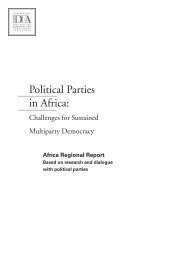Background Document - Danish Institute for Parties and Democracy
Background Document - Danish Institute for Parties and Democracy
Background Document - Danish Institute for Parties and Democracy
Create successful ePaper yourself
Turn your PDF publications into a flip-book with our unique Google optimized e-Paper software.
DIVERSITY AND<br />
EQUALITY MATTERS!<br />
Searching <strong>for</strong> ideas <strong>and</strong> practices that can inspire change<br />
This background document is not about the statistics on women in politics, because<br />
we already know the situation too well. As stated in the Millennium Development<br />
Goals Report 2011 from the United Nations:<br />
“Despite growing numbers of women parliamentarians, the target of equal participation<br />
of women <strong>and</strong> men in politics is still far off.”<br />
Progress is clearly slow, indeed frustratingly slow. Only 26 countries worldwide<br />
have managed to achieve the 30 per cent target <strong>for</strong> women in decision-making positions<br />
set by the Beijing Plat<strong>for</strong>m adopted in 1995. Globally we have still not been able<br />
to climb above 20 per cent. When we dig deeper into the different dimensions like<br />
top leadership positions in parties <strong>and</strong> cabinets at national level, ministerial posts, or<br />
heads of municipal councils, the picture just gets even more depressing.<br />
So despite some progress, the reality we live in continues to be one of discrimination<br />
against women, in law as well as in practice, resulting in both equality <strong>and</strong> diversity<br />
suffering.<br />
Denmark is doing better than most countries in this area. As suggested in the last<br />
article of the background document, maybe the secret is that sustainable equal status<br />
development has been rooted in a combination of top-down <strong>and</strong> bottom-up politics.<br />
The state pushed equality through legislation, but making it a living <strong>and</strong> vibrant reality<br />
required the hard <strong>and</strong> persistent work of various civil society organisations, as well<br />
as strong individuals.<br />
In a sense this is not a new recognition, but rather a general recipe <strong>for</strong> change or<br />
development. But it is nevertheless important to remember when we search <strong>for</strong> ideas<br />
<strong>and</strong> practices that can inspire change. Both sides are important; each side needs the<br />
other.<br />
This is different from stating that every country should now copy what Denmark<br />
has done. We know that this is not possible. While recognising that principles of diversity<br />
<strong>and</strong> equality are important dimensions of a democratic culture, we must accept<br />
<strong>and</strong> underst<strong>and</strong> that they have to be managed <strong>and</strong> practiced in different cultural, religious,<br />
social <strong>and</strong> political settings.<br />
The Christiansborg Seminar is there<strong>for</strong>e not driven by a search <strong>for</strong> the ‘one-size-fitsall’<br />
magic bullet, but rather <strong>for</strong> ideas <strong>and</strong> experiences from our global village, which can<br />
inspire all of us in our different localities.<br />
WOMEN IN POLITICS DANISH INSTITUTE FOR PARTIES AND DEMOCRACY PAGE 4
















